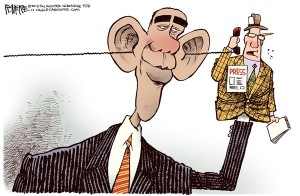The press-punishing, speech-chilling, and unabashedly overreaching actions by the Obama administration against the Associated Press and Fox News Channel’s James Rosen lay bare the essential dynamic between any president and a press that is always more prone to being lapdogs than watchdogs: the president feeds or punishes them as he sees fit, while chanting a bogus rosary about “national security.”
In the case of the AP, the Obama administration secretly subpoenaed phone-call logs and other information from an office where over 100 journalists worked. Officials were on the hunt for the sources that cooperated with the AP on a story about a failed terrorist plot in Yemen. As AP head Gary Pruitt has put it, the administration’s subpoena was “so secretly, so abusively and harassingly and over-broad … that it is an unconstitutional act.” As important, Pruitt says that the subpoena revelation has already chilled even routine news gathering, as government officials have become paranoid—with reason, perhaps—about sharing even banal sorts of information.
To make matters worse in terms of press freedom, there are many reasons to assume the Obama administration is secretly spying on many other journalists and organizations. With Fox’s Rosen, the administration got an actual warrant to read his email and contends that he has committed crimes by pursuing and publishing a story about North Korea, even though the story apparently doesn’t include any classified information per se. Rosen hasn’t been legally charged as of yet, but as Glenn Greenwald notes, the accusations against Rosen parallel government charges against WikiLeaks honcho Julian Assange. “Under U.S. law,” writes Greenwald, “it’s not illegal to publish classified information,” so the Obama administration is claiming that it’s illegal for journalists and publishers to “solicit” such information. That doesn’t simply fly in the face of the First Amendment and Vietnam-era rulings guaranteeing press freedoms, it declares “war on journalism” by essentially criminalizing the very act of investigative reporting.
Because they tend to share his broad outlook on politics, too many journalists for too long have been in the tank for Obama, explaining away or minimizing his policy failures and reversals. Remember Obama’s heartfelt insistence that he would run the most transparent administration ever? Take a look at this document about warrantless searches of text messages that his administration finally coughed up to the ACLU and get back to me. It’s 15 pages of completely redacted prose. Such a document would be funny if it wasn’t coming from a secrecy-obsessed administration that has put the brakes on fulfilling FOIA requests and has charged a record number of people under the Espionage Act.
Then there’s Obama’s cherished belief in his inalienable right to scrag anyone he thinks was connected to the 9/11 attacks or al Qaeda or is otherwise a threat to the good old U.S. of A. Even George W. Bush never wandered into that constitutionally swampy territory—and he was worse than Hitler, Richard Nixon, and Larry the Cable Guy put together, right? Yet it took a 13-hour filibuster by the libertarian Sen. Rand Paul (R-KY) to get a simple—and still squirrely—answer to whether the administration thinks it has the authority to dispatch death drones against citizens on U.S. soil.
And take a quick look at the differences between Senator Obama and President Obama when it comes to war-making power, a split that’s starker than any found in the old Highlights for Children feature Goofus and Gallant. “The president does not have the power under the Constitution to unilaterally authorize a military attack in a situation that does not involve stopping an actual or imminent threat to the nation.” That was Senator Obama, of course. President Obama not only unilaterally dispatched forces to Libya (hello, Benghazi!), he didn’t even bother to follow up 90 days later with a request for authorization, as specified under the War Powers Act. Thanks to his imperial attitude toward the press, journalists are finally taking notice that Obama’s rhetoric is strikingly at odds with his actions. In his recent press conference with Turkish Prime Minister Erdogan—a pioneer in treating journalists like criminals—Obama commented on the AP probe, stressing his belief in “a free press, free expression, and the open flow of information [that] helps hold me accountable, helps hold our government accountable, and helps our democracy function.”
Was Obama so gaseous in the classroom when he taught constitutional law? Such hoary old encomia to abstract verities are laughable in the face of how all the president’s men are actually going about their business of surveilling and harassing the press. As is Obama’s ritual incantation of the need for a federal media-shield law, which he says will help strike the necessary “balance” between the government’s desires to control discourse and the press’s obligation to reveal government actions.
It’s easy to understand why he would be bothered by unwanted leaks in his administration. But his problem is the press’s gain. By definition, any media-shield law is predicated upon the government defining just who counts as a “journalist” and is thus worthy of protection—and who doesn’t count and is thus subject to prosecution. Thanks, President Obama, but we don’t need no stinking press badges, especially in an age where all sorts of decentralized reporting and unconventional news gathering come online faster than the next second-term scandal. The First Amendment is all the shield law any American needs, especially when it’s supplemented by the protections offered by the Fourth and Fifth Amendments. What we really need is a president who lives by the Constitution more than he nods to it.
. . . . . . . . . . . . .
Nick Gillespie is the editor of Reason.com. This article was originally published in The Daily Beast.
